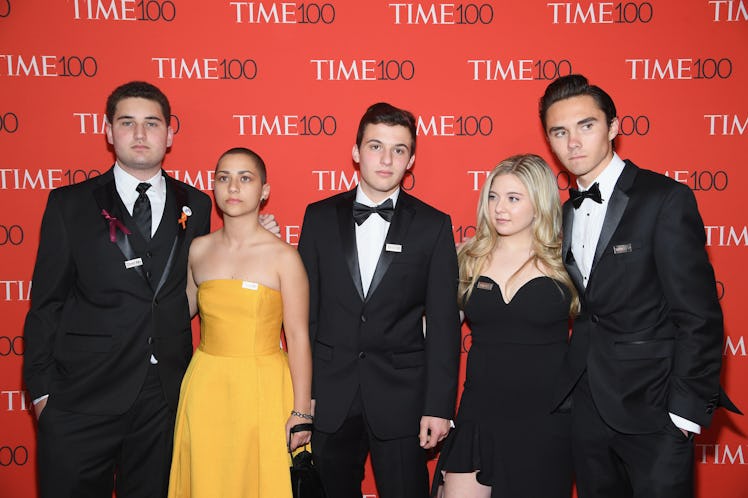
Parkland Students Are Asking People To Stop Sharing The Shooter's Videos & They Have A Point
America's mass shooting problem isn't only about gun control and mental health, and yet after each new shooting, that's where the discussion hovers. The other glaring issue that journalists and users of social media need to consider is that mass murders seek notoriety, and when it is successfully given to them by publishing their names and faces, it can galvanize future actors and endanger more lives — not to mention, re-traumatize survivors of gun violence. Parkland students are asking people to stop sharing the shooter's videos, and the research is on their side.
The debate resurged on Wednesday, May 30, after prosecutors released three cellphone videos recorded by the man charged with shooting and killing 17 people at Marjory Stoneman Douglas High School in Parkland, Florida in February. Some of the videos appear to have been recorded the day of the shooting, per NPR, and in them, he details that his goal is to be "the next school shooter of 2018." The videos are expected to be used by prosecutors to prove the attack was premeditated.
Publications such as The New York Times, The New York Daily News, Newsweek, and networks including CBS, NBC, CNN, and NPR all published stories about the videos — some including the shooter's photo and name. The value of the videos in the courtroom aside, they aren't very informative for the public. NPR reported that the videos provide "little insight" into the killer's motive.
Parkland students like Emma González and Cameron Kasky decried the publicity of the videos and discouraged people from boosting the killer's notoriety — something that he expressed interest in on the cellphone videos.
In a 2017 open letter signed by 147 criminologists, sociologists, psychologists, and other human-behavior experts, researchers pleaded with media outlets to stop publishing the names and photos of mass murderers , citing that fame is a major motivation for similar attacks.
"They want to be celebrities," Adam Lankford, a criminologist at the University of Alabama, told Live Science. "We know that some of these offenders have said things like, 'The more you kill, the more you'll be known,' and 'Someone who is known by no one will be known by everyone.'"
Sadly, the documented examples of this are rampant. The Virginia Tech shooter reportedly interrupted his own massacre in 2007 to mail a tape to NBC to claim credit for it. The man who killed 20 elementary school students in Newtown, Connecticut in 2012 reportedly collected news clips of mass killings. During the court case of the man who massacred 12 people in an Aurora, Colorado theater in 2012, two more shootings happened in movie theaters in just two weeks. The teenager who shot and killed two people in a Maryland shopping mall in 2014 was reportedly obsessed with the Columbine massacre, so much so that he made sure to start shooting at the exact time the Columbine shooters began. During the 2016 shooting at an Orlando, Florida nightclub, which left 49 people dead, the killer is said to have stopped at several points to check Facebook to see if he was on the news.
Top law enforcement officials also recognize this to be true.
“The copycat phenomenon is real,” Andre Simons of the FBI's Behavioral Analysis Unit told NBC News in 2014. “As more and more notable and tragic events occur, we think we're seeing more compromised, marginalized individuals who are seeking inspiration from those past attacks.”
The experts who published the 2017 open letter conceded that the identity of the killer is a logical first question, but they stopped short of saying that a killer's face or name is newsworthy. Instead, they insisted, other details about possible motives, where the weapons were sourced, the killer's past, and interviews with friends and family are fine to publish.
So why do news outlets continue to broadcast the snuff films of killers? Why do people continue to retweet and share the horror? One explanation is that the news cycle is increasing at breakneck speeds to the point where journalists aren't making a conscious decision about the prospective impact of sharing sensitive content. I, personally, find that explanation to be lacking. And to be fair, some of the bigger networks occasionally catch on — CNN's Anderson Cooper opted not to publicize the 2016 Orlando shooter's name, instead reading the names of the deceased.
Then, there's the ratings mentality — the idea that network executives know exactly what they're doing when they exploit human nature's impulse to peek at violence and gore. A popular example of this line of thinking is when CBS's CEO, Les Moonves, said this about the 2016 presidential race: "It may not be good for America, but it's damn good for CBS," per The Hollywood Reporter. He also said, "I've never seen anything like this, and this going to be a very good year for us. Sorry. It's a terrible thing to say. But, bring it on, Donald. Keep going." The idea being, it doesn't matter how destructive this is — it's successful for a company. Sigh.
But there's things you can do to help this! Yes, you. The person reading this on their phone. You can resist the urge to share destructive messages or extremely graphic content. When social media algorithms fail, you can report content to the platform itself. You can vote with your attention — opting to turn off TV news or unfollow outlets that consistently get it wrong. You can screenshot posts instead of retweeting or sharing them, so you don't give the decadence a signal boost. You have more power than you think.